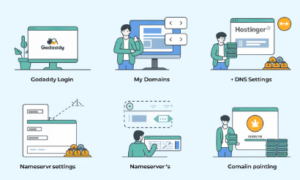Choosing the right provider for your website domain and hosting could be quite a daunting task with all the options on the market. Let’s just narrow it down to three providers: GoDaddy, Hostinger, and IONOS.
Each has its own strengths, features, and prices. In this article, we’ll compare these three giant providers based on their services, performance, customer support, and value for money.
1. Overview of Each Provider
GoDaddy
GoDaddy is one of the most well-known hosting providers, and the largest domain registrar worldwide. They offer a wide range of products and services targeted at small businesses, including website building and hosting, domain registration, marketing tools, and professional email.
Pros:
- Established brand with solid services
- User-friendly website builder designed for beginners
- A comprehensive set of services for small businesses
- 24/7 customer support
Cons:
- Renewal prices are higher than initial offers
- Email and SSL certificates may cost extra
- Upselling can drive up your costs
- Low resource limits for shared hosting plans
- Some support agents lack proper training
Hostinger
Hostinger is one of the biggest players in the web hosting market that has gained popularity due to its affordability and unique features. The company focuses on providing beginner-friendly hosting at a low introductory cost. It’s a great choice for small businesses, startups, and individuals looking for reliable hosting on a budget.
Pros:
- Very affordable hosting plans
- User-friendly control panel
- Free website builder with e-commerce features
- Free email included with hosting plans
- Free backups and malware protection
- Cloud hosting plans offer higher performance
Cons:
- Some advanced features require upgrading to higher-tier plans
- Human support became slower after they added an AI assistant
- Higher renewal rates compared to other competitors
IONOS
IONOS, formerly known as 1&1, is a German web hosting and domain registration provider that has been in the industry for over 30 years. They offer various types of web hosting, from shared to VPS and dedicated hosting. They are known for their competitive pricing and promotional discounts.
Pros:
- Free security features (SSL and DDoS protection)
- Easy scalability when your traffic grows
- Daily backups included
- One free email account included
Cons:
- Lower-tier hosting plans have limited resources (CPU & RAM)
- Additional email accounts cost extra
2. Pricing and Plans
Pricing is one of the most important considerations that should be on the table when choosing a hosting provider. Let’s look at the prices of each host.
GoDaddy
GoDaddy offers different hosting solutions, but let’s just list their standard shared hosting plans:
- Economy (1 website, 25GB storage): $83.88 for the first year, then $143.88 per year.
- Deluxe (10 websites, 50GB storage): $119.88 for the first year, then $203.88 per year.
- Ultimate (25 websites, 75GB storage): $179.88 for the first year, then $263.88 per year.
GoDaddy also offers promotional prices for domain registration, but their renewal rates are quite high. I recommend using a cheaper alternative for your domains regardless of which hosting provider you end up choosing.
Hostinger
Hostinger’s prices are more competitive than GoDaddy’s, with fewer upsells. Here’s a breakdown of their shared hosting plans:
- Premium (25 websites, 25GB storage): $47.88 for the first year, then $131.88 per year.
- Business (50 websites, 50GB storage): $59.88 for the first year, then $167.88 per year.
For those looking for more server power, Hostinger offers cloud hosting starting from $119.88 (first year) for the Cloud Startup plan.
IONOS
Similar to GoDaddy and Hostinger, IONOS offers discounted prices on the initial billing term, but then charges the full price for renewal. This is how much their shared hosting plans cost:
- Essential (1 website, 10GB storage): $48 for the first year, then $72 per year.
- Starter (10 websites, 100GB storage): $72 for the first year, then $96 per year.
- Plus (unlimited websites, unlimited storage): $12 for the first year, then $144 per year.
- Ultimate (unlimited websites, unlimited storage): $120 for the first year, then $192 per year.
IONOS also offers VPS and dedicated servers for those looking for self-managed hosting options without the limitations of shared environments.
3. Performance and Speed
Website performance is critical, as slow load times can impact user experience and SEO rankings. Let’s compare the speed and performance of each provider.
GoDaddy
GoDaddy’s hosting performance is generally decent, though some users report occasional slowdowns. Their shared hosting plans are fine for smaller websites, but larger websites may experience performance issues during traffic spikes. They offer high-performance plans, but these come at a significantly higher cost.
Hostinger
Hostinger is generally pretty fast for low-traffic WordPress sites. They utilize a built-in CDN, object caching, and LiteSpeed server caching, which can all boost website loading speed. It’s fair to say that in terms of speed and performance, Hostinger beats both GoDaddy and IONOS at similarly-priced plans.
IONOS
IONOS shared hosting offers good performance for the price, however, some users report that it can lag behind some competitors in terms of loading times. Their lower-end plans come with a limited amount of RAM, so WordPress sites that use heavy plugins may experience performance issues due to memory limits.
4. Customer Support
Customer support is another critical factor that should guide your selection. The quality of customer service can make or break your experience, especially if you run into technical issues that need urgent attention.
GoDaddy
GoDaddy offers 24/7 customer support via phone, live chat, and email. They also have a useful knowledge base with tutorials and articles that explain many of the common issues and how to fix them.
However, some users experience long wait times on the phone, and there are complaints about some support staff not being helpful.
Hostinger
Hostinger’s technical support team is available around the clock. Chat requests get answered by an AI assistant, which can provide instant answers and solutions to common issues. You can ask it to forward the request to a human support agent. Human support is usually quick, but sometimes you may have to wait a few hours to receive a response.
IONOS
IONOS offers 24/7 support via phone, email, and live chat. Sometimes, phone and chat support can be busy or unavailable. Their support staff is generally knowledgeable and helpful, however, some customers report difficulties when dealing with billing and cancellation requests.
Conclusion: Which is Best for You?
The best web hosting provider for you depends on your specific needs and budget. You have to weigh the pros and cons of each service in order to find the one the best suits your project.
GoDaddy has a good website builder and marketing tools for small businesses. Hostinger has more affordable web hosting plans with better performance. IONOS has low introductory and renewal prices, and they have better deals on VPS hosting than both Hostinger and GoDaddy.
Make sure that you take into account the renewal cost, not just the discounted initial price. You’ll find that GoDaddy has the highest long-term cost of the three due to high renewal fees and expensive add-ons.



































